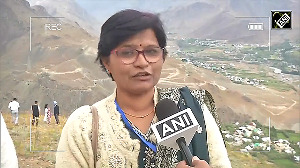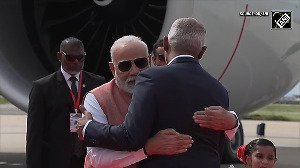The wait in Dubai is made easier with the offer of a free massage or a trip to the gymnasium. Once in New York, first-class passengers can negotiate the traffic in a free Cadillac De Ville (for four days) and they can even stay at the famous Ritz Carlton situated conveniently in midtown-Manhattan.
Why the mile-high generosity from Emirates? The Middle Eastern airline that's moving aggressively to carve a bigger place for itself in the aviation industry, is determined to convince passengers - mainly Indian - that it doesn't take longer to fly via Dubai to New York.
Most Indians currently stop over in European cities like Frankfurt, London, Paris or Amsterdam on their way to the US of A. Emirates is also about to unleash an ad blitz with the message that it's easier via Dubai.
Fasten your seatbelts. A turbulent bout of mid-air uber competitiveness is about to break loose. Every year, over 2 million passengers fly between India and the US and the market is growing in leaps and bounds because of the IT and business boom between the two countries.
As more passengers pull out their travel bags, the international carriers are flying in with a medley of offers -- everything from more seats to better connectivity timings and, of course, attractive promotional offerings.
This is a slightly unusual battle and one that's difficult to keep track of because there are no direct flight to the United States -- though there is one to Canada. Only two American airlines fly to India and even they have only a limited number of flights.
As a result, it's mostly the European carriers that have flown in to fill up the gap. These airlines like Lufthansa, British Airways, Air France and KLM take passengers from India to the US via Europe.
But now the non-European airlines are checking-in with their own offers. Flying in ahead of the pack is Emirates, which, on June 1, launched a nonstop flight from Dubai to New York.
Emirates will, almost certainly depend heavily on Indian passengers to fill its flights and argues that the under-17-hour flying time from Delhi to New York is nearly the same as flying via Frankfurt on Lufthansa.
The Middle Eastern airline flies 43 times a week to India. Says a senior Emirates executive: "We hope to attract both leisure tourists who want a break in Dubai as well as business travellers from India to New York."
Also lifting off from the ground is Air Canada, which recently introduced a 15-hour daily direct flight from Delhi to Toronto at an attractive price of around Rs 52,000. Air Canada offers a host of easy connections to different American cities from Toronto, so it's the nearest to a nonstop flight to the United States.
But there are others wooing customers with a surprising degree of innovation. Singapore International Airlines, for instance, is trying to lure passengers over the Pacific with the offer of nonstop flights from Singapore to Los Angeles and even New York.
Why should travellers take what seems like a longer route? Firstly, the airline points out that travellers from south Indian cities like Chennai can reach New York with about 22 hours of flying time.
Of course, that is much longer than travelling via Europe. But Singapore Airlines is promising unmatched comfort levels even in economy class.
It has ripped out half the seats in its wide-bodied aircraft and will have only 181 passengers on the plane compared to the normal over 300. Airline industry executives say that for Rs 65,000 to New York passengers virtually get business class comfort while travelling economy.
But the established airlines aren't sitting ducks waiting on the runway to be shot to pieces. Air-India is frantically leasing planes so that it can start more flights to the United States. Since 2002, Air-India has virtually doubled capacity between the two countries from 5,000 in December 2002 to over 10,000 seats a week currently.
That's only for starters. Now the national carrier is climbing swiftly and by June 2005 will up the number of flights to the United States from 23 a week to 31. That will be an additional 3,400 seats every week.
Air-India is also getting back ambitiously into the US market and is looking at flying to cities like San Francisco, Washington, Houston and Dallas. Equally crucially, it will start a direct, nonstop flight to American in less than a year.
Says V Thulsidas, Air-India's chairman and managing director: "The nonstop flight is a different market. They are smaller aircraft with few seats and will attract higher tariffs. We are looking at this market and will start a service in the future."
Even Lufthansa, the giant in the westbound air travel market, is getting ready to take on the new competition. In the next three years it hopes to double the over 10,000 seats it currently offers weekly. About 40 per cent of the passengers who travel by Lufthansa fly onwards to the US.
Most importantly, it will fly to several new Indian cities. Says Werner Heesen, director, south Asia, Lufthansa: "Last year India was the number two market for Lufthansa in Asia after Japan. This year alone we are increasing capacity by 18 per cent so we expect to gain 2 per cent to 3 per cent market share in the Indo-US market."
One definite sign about how the market is growing and also becoming more competitive is that the total number of seats from India to Europe has gone up by 20 per cent in the last 12-18 months.
Inevitably, a large number of the people flying westbound out of India head to the US. Some airlines reckon that 15 per cent of their passengers head onwards to the US and others say it could be as high as 40 per cent.
It's not tough to understand why the India-US air travel market is crucial. It constitutes around 20 per cent to 25 per cent of India's total air travel market of about 8.8 million (that includes both inbound and outbound).
Industry analysts reckon it's worth about Rs 1,600 crore (Rs 16 billion) and growing rapidly. And more importantly, it accounts for over 27 per cent of the 4.8 million per annum outbound air travel market from India.
Of course, industry statistics can vary quite astonishingly. The Government reckons that passenger traffic to and from India and the United States grew by a huge 40 per cent in 2002-03.
Industry experts predict that traffic on the India-US route could grow by anywhere between 8 per cent and 15 per cent, which they reckon is very healthy.
Amadeus, the international reservation system, says that westbound traffic grew by 12.5 per cent between January and May over the previous year. The growing demand has led to seat shortages during peak seasons.
The importance of the US market is likely to grow even more. The only discordant note is the tighter visa rules which are discouraging some travellers. Says Balbir Mayal chairman of travel agency New Airways: "This is one area which might stunt growth though business travel will only grow."
In this competitive market each airline has its own fightback strategy. Lufthansa, for instance, says it will capitalise on the fact that it flies to a clutch of US cities.
By contrast, Emirates flies only to New York. Says Heesen: "New York is only 20 per cent of the US market. But what we offer to Indian travellers is a one-stop flight to over 15 destinations in the US."
Lufthansa argues that it's still one-up on Emirates because the journey via Frankfurt or Munich is more convenient because of the flight lengths. A Mumbai-Dubai flight is about one and-a-half hours followed by a 14-hour haul to New York. By contrast, Mumbai-Frankfurt is eight hours followed by another six hours over the Atlantic.
Lufthansa is also offering its passengers choice in other ways: it has introduced morning flights from India for those who don't want to take the night flight. Even more importantly, it will soon be landing in new destinations -- possibly places like Trivandrum and Hyderabad.
However, there's a price tag for all these services. Lufthansa says its tickets are about 7 per cent to 8 per cent costlier than Air-India (Lufthansa fares are around Rs 54,600 compared to Rs 52,000 on Air-India).
Emirates is playing a different positioning game. For starters, it's popularising its New York flight with a promotional offer that's on till August 31.
Also, it will soon start flying to other US cities plus Canada and possibly even south America. For leisure travellers who might want to stop and shop in Dubai it has tied up with hotels and is offering special packages for US-bound passengers.
Air-India is hoping it can attract Indians who aren't used to air travel feel at home on the national carrier. More importantly, it has the advantage of being able to fly directly to America without stopping in places like Dubai and Frankfurt. Says a senior executive of Air India: "Our product is the best because passengers do not have to change planes while going to the US."
That's not all. Air-India says it offers seamless connectivity to the US from various cities, including Kochi, Ahmedabad and Hyderabad. Though the international flights take off from Delhi or Mumbai, passengers from smaller cities clear customs and immigration and check-in luggage at one shot.
For sheer comfort and style it will probably be tough to beat Singapore Airlines. Even in economy class there will be only 117 seats. And SIA has introduced a bar-like snack corner on the flight that allows passengers to stretch and socialise.
Also, the airline is wooing passengers with double mileage points on these flights. Says B K Ong, general manager, SIA in India: "Being nonstop flights the demand on these flights will increase from US to India as well as the other way."
What will passengers decide? Will it be Frankfurt, Dubai, Singapore or even Toronto? Or, will Air-India steal the day with the promise of direct flights to north America? What's sure is that passengers will get a better deal than ever before as the airlines conduct their slugfest in the skies.
TRAVEL ITINERARY
- June 28: SIA launches direct flights to New York from Singapore
- June 1: Emirates launches direct flights from Dubai to New York
- March 30: Lufthansa introduces three morning flights to Munich
Additional reporting: Bipin Chandran





